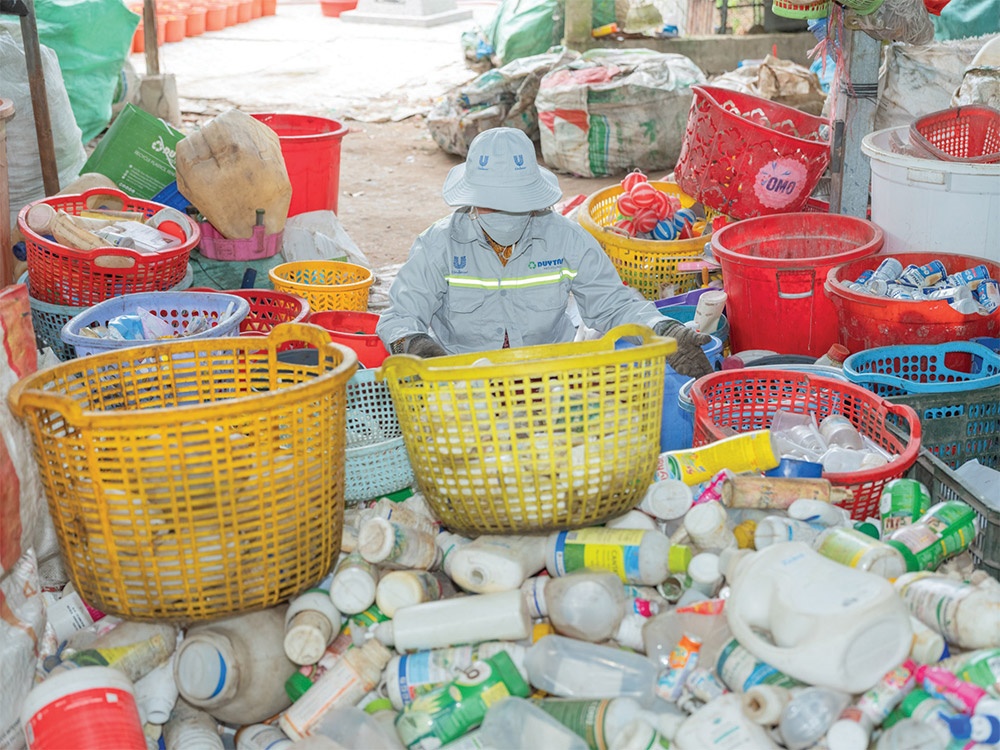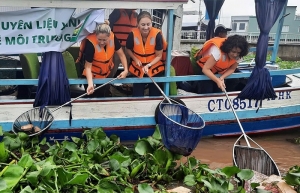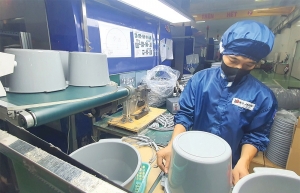Groups turning waste into green resources
The issue of sorting household solid waste at source is becoming increasingly urgent. From January 1, the Environmental Protection Law will make waste sorting a mandatory requirement, with administrative penalties for non-compliance.
 |
| More businesses have been introducing schemes to recycle waste, Photo: Duy Tan Recycle |
Dang Huu Binh, deputy general director of the Hanoi Urban Environment Company (URENCO), said that the city has implemented waste sorting in the districts of Ba Dinh, Hoan Kiem, Hai Ba Trung, Dong Da, and Nam Tu Liem.
On average, around 380 tonnes of recyclable waste are collected daily, along with over 250 tonnes of bulky waste and more than 200kg of hazardous waste, such as batteries. Hoan Kiem has implemented the most successful programme in Hanoi thus far, collecting over 330 tonnes of waste daily, accounting for 89 per cent of the total collected.
“Sorting waste at source not only brings positive results for the environment but also benefits the businesses and localities that implement it,” Binh said. “As people’s awareness improves, it will change the way waste is collected and transported. A portion of the waste will be recycled and returned to serve daily life, reducing production costs for businesses and saving collection and recycling costs for the government.”
According to URENCO, the cost of processing each tonne of unclassified waste is around $20. Source separation is expected to help Hanoi save approximately $3,600 per month in government expenditure.
Data from the Environmental Pollution Control Department under the Ministry of Natural Resources and Environment showed that Vietnam generates around 67,000 tonnes of household waste daily, with urban waste accounting for about 60 per cent. Large cities such as Hanoi and Ho Chi Minh City each generate over 6,000 tonnes and 9,500 tonnes of waste daily, respectively, with landfill rates as high as 90 per cent.
Landfilling not only puts immense pressure on the waste treatment system but also increases the risk of environmental pollution. While many developed countries are focusing on turning waste into resources, Vietnam is still wasting significant resources from its waste.
Vital at all stages
Vu Minh Duc, senior advisor at the Norwegian Embassy in Vietnam, stated that almost all waste is recyclable in Norway.
“Household waste, such as organic waste, food, and plastics, will be actively sorted by residents at home before being collected by city authorities. Afterward, it will be processed to create valuable resources, such as fuel for buses instead of diesel, carbon dioxide that can be used to supplement plant growth, while the remaining waste is turned into organic fertiliser for agriculture,” Duc said
Norway is currently a decade ahead of other EU countries in the fight against plastic waste, with a recycling rate of up to 97 per cent. Through its circular economy action plan, the country is also looking to reduce the need for new natural resources in production, focusing instead on reuse and recycling to generate less waste.
“Co-processing is an area where Norway has expertise and has successfully piloted in Vietnam. Vietnam has a high level of plastic waste, and our projects focus on all stages of collection, recycling, and treatment, including plastics that cannot be recycled,” he added.
According to the International Finance Corporation and the World Bank, Vietnam is wasting nearly $3 billion annually by not recycling all household plastic waste, while almost 70 per cent of organic waste is not recycled, leading to a waste of over $30 billion each year.
To address the surplus of household waste, businesses have been actively adopting and implementing initiatives to recycle and transform household waste into resources.
Effective means
In January, Bamboo Capital Group completed a deal with Tam Sinh Nghia, entering the waste-to-energy sector. Just six months later, the Tam Sinh Nghia waste-to-energy plant broke ground, contributing to optimising recycling efficiency and reducing waste in urban areas.
Dr. Hoang Trung Thanh, a member of Bamboo Capital’s Board of Directors, said, “The waste-to-energy solution is an effective way to deal with waste, especially as the amount of waste in urban areas increases by 10 per cent each year due to population growth.”
In addition, Bamboo Capital is building a comprehensive circular ecosystem, with close cooperation among its member companies. BCG Energy, a member of the Bamboo Capital ecosystem, is constructing a waste-to-energy plant at the North-West Solid Waste Treatment Complex in Cu Chi district in Ho Chi Minh City, with a processing capacity of 2,000 tonnes per day, expected to be completed by the end of 2025.
Meanwhile, the ash and slag remaining from the waste incineration process will be recycled into building bricks by Tracodi, another member of Bamboo Capital. These products will be used not only in Tracodi’s construction projects but also in BCG Land’s real estate projects.
Under the 2020 Environmental Protection Law, from January 2025, those who fail to sort their waste or dispose of it at the wrong time or place may have their waste collection services refused. However, to accelerate the process of sorting and recycling effectively, many experts believe that Vietnam needs to introduce policies that encourage businesses to invest in waste recycling.
Pham Minh Nguyet, business development manager at Alba Group in Vietnam, said that the company is interested in investing in Vietnam, but for the project to benefit society and have a social impact, a suitable investment environment and government incentives are needed.
“To draw in foreign investment in waste recycling, the Vietnamese government should continue to implement policies on waste collection and sorting at source, and require businesses to use recycled plastics in packaging products,” Nguyet said.
“From the implementation of the extended producer responsibility policy, I have seen positive development directions in Vietnam and expect that in the next five years, Alba will continue to invest in additional projects in the country.”
Dr. Muthukumara S. Mani, lead environmental and climate change economist for Southeast Asia at the World Bank, said that Vietnam needed additional financial mechanisms to increase efficiency in collection and recycling. “The financial gap for the circular economy is projected to range from $426 billion to $1.2 trillion by 2040. For Vietnam, this financial gap is estimated to be $28-40 per tonne of plastic for collection and $24-40 per tonne of plastic for recycling,” Mani said.
| Pham Minh Tuan, CEO Vikohasan Vikohasan, specialising in recycling PET plastic, starts its operation in 2018 with a capacity of around 180-200 tonnes per day. After the recycling process, our factory will produce polyester fibre used in stuffed animals, clothing, and pillows. Approximately 60 per cent of the recycled products will be served for the export market, while the remaining 40 per cent will cater to the domestic market. Currently, despite Vietnam having a large amount of valuable waste, only 40-50 per cent of Vikohasan’s recycled materials come from the domestic market. The rest still needs to be imported from foreign countries. Vikohasan, along with other recycling companies, is having to purchase aluminium cans in the domestic market at nearly $2 per kilogramme, PET plastic bottles at 60 US cents per kg, even though these materials are essentially waste. On the other hand, we are also facing difficulties in finding a domestic partner to supply materials, as there are not many waste collection companies that operate on a large enough scale for sorting and processing to supply to recycling companies. To address these challenges, Vikohasan has managed to find some professional waste collectors and recyclers to purchase materials at competitive prices. We also collaborate with the German Development Agency to implement a textile recycling scheme with garment companies through source sorting programmes and responsible recycling management. We have now connected with professional units to ensure that the materials needed for recycling are delivered to the right recycling facilities. Le Thi Hong Nhi, director, Communications and External Affairs, Unilever Vietnam Unilever has been implementing zero waste for the past 10 years, continuously seeking partners and supporting them in efficiently carrying out the initial stages of waste sorting at source. As a result, the company has recovered materials to produce recycled plastic for Unilever’s product packaging, creating high economic value and positive environmental impact. We collaborate with women’s unions, waste collection and recycling units, raise public awareness, organise Clean Day events to collect waste, and then deliver it to recycling facilities for sorting and recycling. To date, the programmes initiated by Unilever have reached approximately 20,000 households, with about one million Unilever consumers aware of the importance of plastic sorting and recycling. However, Unilever has identified several challenges that need to be addressed. The public is not fully convinced and lacks the motivation to sacrifice convenience. The management sanctions for those who sort waste are not significantly different from those who do not. The extended producer responsibility policy also treats the use of virgin plastic and recycled plastic equally, which is not enough to encourage businesses to invest in waste collection and recycling activities. Only when there is a financial mechanism to encourage businesses to use recycled materials can the waste output be resolved, and a new cycle can operate effectively, waste sorting at source will be meaningful. Meanwhile, current environmental funds are only investing in vehicles, while technology is also a way to solve the problem of classification, collection and recycling but has not received due attention. |
 | Vietnam urged to accelerate fight against plastic waste Vietnam is being cautioned about the increasing levels of plastic waste entering its water environments, undermining both environmental quality and the country’s sustainable development efforts. |
 | Reviving a new life cycle for plastic waste Discarded plastic items will have the opportunity to be reborn as new products, re-entering the consumer market with different missions and values. |
What the stars mean:
★ Poor ★ ★ Promising ★★★ Good ★★★★ Very good ★★★★★ Exceptional
Related Contents
Latest News
More News
- A golden time to shine within ASEAN (February 19, 2026 | 20:22)
- Vietnam’s pivotal year for advancing sustainability (February 19, 2026 | 08:44)
- Strengthening the core role of industry and trade (February 19, 2026 | 08:35)
- Future orientations for healthcare improvements (February 19, 2026 | 08:29)
- Infrastructure orientations suitable for a new chapter (February 19, 2026 | 08:15)
- Innovation breakthroughs that can elevate the nation (February 19, 2026 | 08:08)
- ABB Robotics hosts SOMA Value Provider Conference in Vietnam (February 19, 2026 | 08:00)
- Entire financial sector steps firmly into a new spring (February 17, 2026 | 13:40)
- Digital security fundamental for better and faster decision-making (February 13, 2026 | 10:50)
- Aircraft makers urge out-the-box thinking (February 13, 2026 | 10:39)

 Tag:
Tag:


















 Mobile Version
Mobile Version